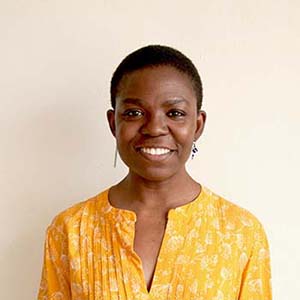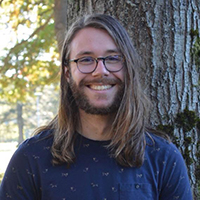Patterns of Breath: Chris Horne in Conversation with Jane Akweley Odartey

Jane Akweley Odartey, whose poem "Conversing with the Farmers" appeared in The Malahat Review's Spring 2019 Issue #206, discusses family, first (and second, and third) languages, and what influences her writing in her Q&A with Malahat Review volunteer Chris Horne.
Jane Akweley Odartey is a Ghanaian-American poet, writer, photographer, artisan and educator based in super-duper diverse Queens, NYC. She blogs at janethroughtheseasons.com and her work has appeared in Clarion Magazine, North Dakota Quarterly, Verity La and elsewhere. Jane is interested in the human heart and what it means to love self and neighbor—organic & inorganic.
Your poem is highly lyrical and rich with internal rhyme. I did some digging and found your self-published chapbook, The Spews of Seasons, which, quoting the summary, revolves around recording perception "through the cycles of inhaling and exhaling." How do patterns of breath and the orality of words play into your process? Does the lyrical flow of your poetry determine its structure or vice versa?
One could say the flux of words that a page extracts from me become puzzle pieces that sync together through their own music. I suppose my Mother’s tongue and first language, Krobo, a quite rich lyrical language, influences how I perceive and compose words in all other languages. And yes, I entertain patterns of breath in all my work because it is at once life and poetry. Breath is dance to the music of the heartbeat, and every individual dances, in breathing, to that music which plays solely for them and which without we cease to be, at least in the realm of the corporeal—I am at once a fan of the gross and subtle heart, although both frighten me, and I write, often, without a conscious agenda, in the hopes of learning my heart’s language.
There's a surreal, perhaps even nightmarish, quality to this poem. And while it is ostensibly about a conversation with "the Farmers," it seems to also be in dialogue with the subconscious mind. How does your poetry reflect or explore the subconscious? Is this a consistent theme in your work?
In grad school, I encountered St. Augustine in a mysticism class. His Confessions fascinated me and I was especially awed by his theories on memory. He reflects that as human beings, we are often amazed by the sublimeness of the universe, yet most of us are unimpressed by our beings or the mind which somehow manages to contain the entire universe within itself. In contemplating what he knows, Augustine comes to the conclusion that there are things he knows yet is unaware of knowing. His reflection ignited in me a curiosity for what I know yet am unaware of knowing. But even prior to encountering Augustine, I entertained the theory that it is quite possible that there exists significant intelligence deeply buried under what one is able to recall.
Since my work is also a practice to explore the layers of selves I possess and what lays beneath all of them, I am always interested in the subconscious state. Oh, I do believe all is surreal. That which one deems mundane is that which one has dismissed as familiar and has stopped to question and investigate. The same definition applies to nightmares. In his poem, “Alone,” Edgar Allan Poe ends with the lines “And the cloud that took the form / (When the rest of Heaven was blue) / Of a demon in my view.” Raising the question of how a daymare differs from a nightmare and what the relationship is between the collective illusion of seeing blue skies and the individual hallucination of a demon cloud.
The lines "high- / boredom hive-joy and ivory eyelet laces are in style / again" seem to highlight the fickleness of modern consumer consciousness but define it in distinctly non-anthropocentric terms ("hive-joy"). Similarly, the poem's frequent personifications blur the binary of human/nature. What was your intention in giving human qualities and agency to the natural forces and figures in the poem? Does “Conversing with the Farmers” seek to reconcile our patterns of desire with the natural world?
The first draft of “Conversing with the Farmers” was in late November of 2017. In the same month of the year previous, I had lost my Nana. Though Mother’s Mother, she raised me for many significant years in Ghana while Mother tried to makes ends meet in New York. In order to travel to my home country for her funeral I had to quit a job which seemed to hold promise of financial security but which was also transforming me into a very unhappy person. As I contemplated the decisions I had made: giving up financial security for filial duty, I wondered also about my duty to my being. How do I show it gratitude? From my observation of the corpse of my awesome Nana, a flesh that would not even hold her resemblance in death, I saw my own body and what I shall take away in death. I became impressed upon to seek answers to the question of one’s duty to one’s entity, and how to live and die with as few regrets as possible. It seems some of these answers could be found through observing life from several vantage points: if frogs quarreled with unripe tomatoes about color, what face would logic wear? Is the root of foolishness the arrogance or ignorance of one’s intellect? How does one shovel through obnoxious and impotent pleasure to rescue underneath a boredom pregnant with creativity?
I am a loner, who, borrowing Rilke’s words, likes to take walks in my own mind. And it is not lost on me that I know intimately John Clare’s line, “I am the self-consumer of my woes.” But I am also the chief producer of my woes. So why do I suffer? Because it is entertaining in its ability to absorb my entire awareness. Yet it is not what I want for my life. I do not care to be a Sethe to my internal Beloved, as Toni Morrison brilliantly observed.
To your observation about the probability of “Conversing with the Farmers” alluding to “reconciling our patterns of desire with the natural world,” I would like to say I do entertain these thoughts. Yet when I consider your question I am reminded of the poem “The New Age” by Stevie Smith, particularly the lines, “Well, say geological time is a one-foot rule / Then Man's only been here about half an inch to play the fool / Or be wise if he likes, as he has often been.” Aligning with Smith’s perspective, one could say the contemporary human being is still an infant, and though it still appears to many of us that having many toys will bring us satisfaction, several of us are already learning that this is not particularly true; numerous toys means less space, more maintenance, and less time to enjoy each piece thoroughly. Thus just a simple good toy could be more satisfying. And some of us have even come to understand that if we endure boredom patiently enough without any objects of distraction, we still arrive at a premise of fun and discover its source as internal.
Given that you have an MA in English lit, what authors inform your writing? Has studying literature changed your writing practice or your expectations of your own work?
One of the risks I am happy to have taken in life is to abandon my practical business major for one in English literature. It was a difficult decision to make for I felt pursuing a path of much uncertainty in regards to my future finances would be taking lightly my duty as daughter to a single mother who has had to work so very hard to make sure I knew little worry. But it was exactly through the generous love I had been a recipient of my whole life that I found the courage to pursue something that made my heart leap. I am now working on becoming fluent in Mandarin and French just so I can read more broadly.
Regarding how literature has informed my work, it has provided me with lifelong friends. One of such friends is Shakespeare whom I encountered in my elementary school days in Ghana, particularly through the following lines in Julius Caesar:
Cowards die many times before their deaths;
The valiant never taste of death but once.
Of all the wonders that I yet have heard.
It seems to me most strange that men should fear;
Seeing that death, a necessary end,
Will come when it will come.
Yet my favorite poet and author is Thomas Hardy from whom I learn to work with contradicting thoughts and write with genuine feelings. My luck being awesome (I suspect I have a mischievous, albeit magnificent Guardian Angel), Grace Schulman, the wonderful poet, was my first poetry professor and through her kind guidance I began to entertain the prospect of becoming a poet. My other influences are Yeats, Marjorie Welish (another outstanding professor of mine) Norma Cole, Christian Bök, Marilynne Robinson, Blake, Dickinson, Chaucer and Poe. More recently, I am drawn to orient classical poets like Vyāsa, Chuang Chou, Bai Juyi, Yi Saek and Persian poets like Rumi and Hafiz. I just finished Meditations on the Tarot: A Journey into Christian Hermeticism which was recommended as a reference for my dissertation by my grad school thesis advisor, Nicola Masciandaro, another one of my brilliant professors whose influence is palpable in my work. Presently I am reading Mrs. Humphry Ward’s translation of Henri Frederic Amiel’s journal and it feels as though I am encountering a new friend who is going to guide me for a very long time. I have also started reading The Basic Works of Aristotle and I am curious to how it shall impact my mind.
At the end of his life, Thomas Aquinas realized that the tremendous amount of work he had produced amounted to about a drop in an ocean. I am not ambitious enough to even want to attempt a quarter of a drop in an ocean. My hopes for my work is to learn to translate my heart in its beauty and ugliness so I, too, can know it better.
You're a prolific artist with a lot going on: a blog, a craftwork studio, and published poetry, fiction, nonfiction, and visual art. What's the next step? What projects are you working on right now?
I must confess that I am a happy procrastinator and the “a lot going on” are ways in which I am able to simultaneously procrastinate and get something done. It is difficult for me to be obsessed with any one thing, and I have begun to say to others that I specialize in not specializing. I am only able to approach my interests from distances, I am only able to do anything by not putting too much importance on it. So I must knit to write and write to knit. In other words, I become paralyzed in moving towards the future if I put too much significance on it. I can only make it to the future by merely respecting the present and loving it best I can without much fussing. So these days I am savoring Japanese incense and continuing my series of failed attempts to get a glimpse of that attractive solitude Emerson wrote about.

Chris Horne
* * * * * * * *









